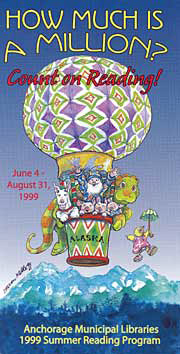| The Anchorage Municipal Libraries Summer Reading Program creates a community of young readers by encouraging them to read, and by giving them a place to share their ideas with their peers.
The average child spends four to five hours a day in front of a buzzing screen, compared to the 30 minutes of reading per day.* Encouraging a child to read a book, with the modern distractions of television, video games, and the internet, can be quite a struggle. But there is help.
 |
| Summer Reading Program Poster |
 |
The Summer Reading Program at the Anchorage Municipal Libraries seeks to introduce children to the pleasures of reading. Children come together every two weeks during the summer for an informal discussion of the books they are reading. They meet around a large table in a private room to share refreshments and talk about the ideas in the books they are reading.
Jane Baird, the young adult librarian at Loussac library, is one of the librarians who leads the discussions.
"The atmosphere is relaxed and easy," she says. "There are no grades or lessons. We want children to enjoy reading and share their thoughts on what they read."
Baird and the other facilitators encourage children to participate, but never press them to speak. "Reading a book can be a personal and emotional experience," Baird says. "If children don't want to speak, their choice should be respected."
But most children do express their opinions. Sometimes, Baird jokes, the challenge is getting them to stop speaking.
Librarians facilitate discussions, but they do not come to meetings with their own agendas. They ask the children what they want to talk about, what they liked about the book, how the story affected them.
The program's goal is to make children life-time readers, and immediately there are three positive effects:
- Children are reading (actively using their minds and imaginations).
- Children come to the library and are immersed in the world of books.
- Children learn to set aside time during the week to read, and they soon realize that there are other things to do at home besides watching cartoons and killing ninja warriors.
Children of all ages are encouraged to participate in one of three different levels:
- Preschool - where parents read to their children.
- Independent (grade school) - where children read what they want.
- Teen - where all children read the same book.
Each child records the hours he/she has read each day on a special chart. The chart is generally for younger readers, but since many of the teens started as younger readers, they continue to use the self-rewarding charts. Prizes (stickers, erasers, pencils and gift certificates) are given to readers for accomplishing a certain amount of hours, and during the summer of 1999, completed charts were put into a drawing for the grand prize of two roundtrip tickets to Denver.
Preschool and independent readers have a more flexible schedule and are encouraged to read as much as they want. Teens are expected to read a book every two weeks, some of them quite rigorous, such as Fahrenheit 451 or George Orwell's 1984. They discuss the themes of the work and what they liked about the novel. They also consider craft, setting, plot, and character.
"1984 led to a heated discussion on censorship," says Baird. "And though most of the students struggled through the novel, they could be overheard saying 'I liked it' as they left the library."
The Summer Reading Program gives young readers a community in which to share their thoughts in a mentally stimulating environment, which is particularly important during summer vacation.
So, in a time when buzzing screens seem to be swallowing up the souls of children, remember there are programs out there motivating children to read and think. Encourage children to share in the wonders of the written word. Look for information about the Summer Reading Program at Loussac or at any of the branch libraries.
* Numbers according to Barron's Nov. 8th, 1999
Summer 1999's reading chart design was the cover of How Much is a Million, by David M. Schwartz, illustrated by Steven Kellogg.
|




